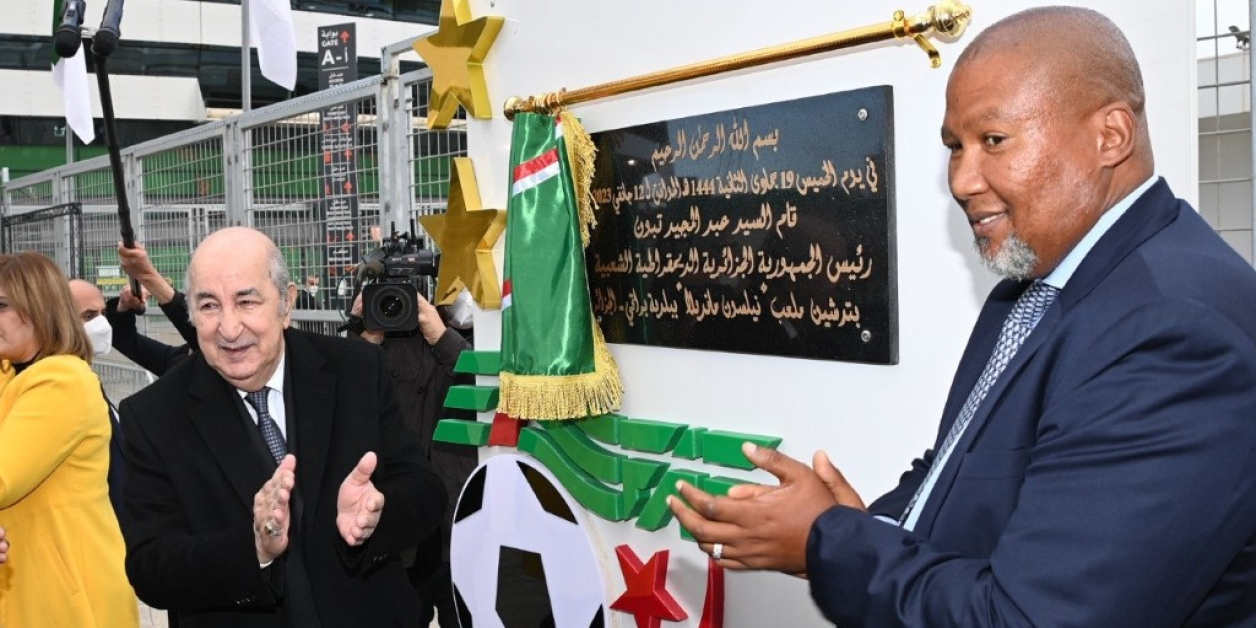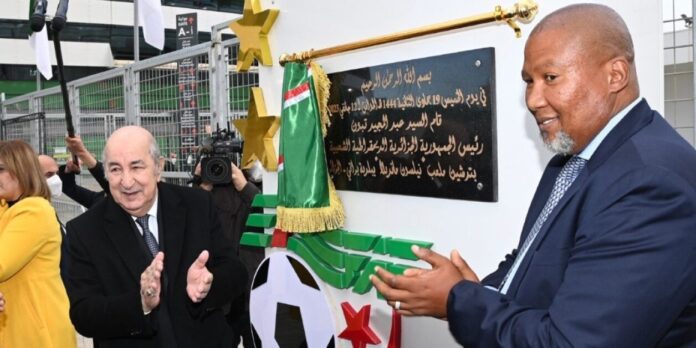
Algerian President Abdelmadjid Tebboune and Nelson Mandela's grandson Zwelivelile Mandla Mandela at the opening ceremony of the Nelson Mandela stadium ahead of the African Cup of Nations (Chan) in Algiers, January 13, 2023. © Presidency of Algeria / Handout / ANADOLU AGENCY/Anadolu Agency via AFP
“Last colony present in Africa”, “fight for freedom”, Moroccan “oppression”… It is difficult to imagine a better provocation than the one carried out on January 13 by Zwelivelile Mandla Mandela, grandson of Nelson Mandela, during the opening ceremony of the African Championship of Nations (CHAN) 2023. Invited by Algeria to speak at the brand new stadium named after the former South African president, the descendant of Madiba made an attack on Morocco, and called for “the fight for the liberation of Western Sahara”.
A double affront to Morocco, holder of the title, which ended up withdrawing from participating in the competition following the refusal of the Algerian authorities to issue a flight authorization to be able to make a direct connection between Rabat and Constantine. The following day, the Royal Moroccan Football Federation (FRMF) denounced “blatant transgressions that have no connection with the principles and values of the round ball”.
More recently, in a column published on March 31 in the weekly newspaper of the African National Congress (ANC), the ruling party, Alvin Botes, South African deputy and deputy minister responsible for international relations and cooperation, made a violent accusation against Morocco, inviting public opinion on the continent to strengthen its support for “Africa’s last colony”.
provocative analogy
After inviting foreign companies not to negotiate with Western Sahara, Alvin Botes concluded his text by relating a statement by Nelson Mandela – “Our freedom will not be complete without the freedom of the Palestinian people” – and current South African president Cyril Ramaphosa: “ The achievements of our democracy cannot be complete until the Saharawi people's desire for freedom and justice has been fulfilled. Summer sated. »
A deliberately provocative analogy that did not fail to make the Moroccan ambassador in Pretoria, Youssef Amrani, react. In his response dated April 4, the former chief of mission of the royal cabinet denounces “pejorative, unfounded and untimely accusations, as well as an advisor blind to Algerian theses”, and accuses his opponent of “disseminating the propaganda of the Front Polisario”.
And the ambassador recalls the “historical truth admitted by the late Nelson Mandela himself” about “Morocco’s historic commitment to the fight against colonization and apartheid in South Africa”. Appointed in August 2018 by the king but accredited in March 2019 by South African authorities, Youssef Amrani had already sent an open letter in 2021 to South African Deputy Minister of Foreign Affairs Candith Mashego Dlamini to respond to comments similar to those of Alvin Botes.
“Decolonization”
These latest arms exchanges are quite symptomatic of relations between the two countries, which have never been in good shape. If Pretoria recognizes the (self-proclaimed) Sahrawi Arab Democratic Republic (SADR), relations between South African, Algerian and Polisario leaders are much older and have their roots in African independence.
“The ANC and other historical solidarity movements met during the struggle for decolonization, in the 1960s and 1970s,” explains Thierry Vircoulon, associate researcher at the French Institute of International Relations (IFRI) and co-author of the book The Maghreb and its South: towards renewed ties. “In the early 1960s, Nelson Mandela went to Algeria to learn about and observe the functioning of the FLN. At the time, the ANC was in exile and gravitated towards the networks of liberation movements”, continues the researcher. The ANC then supported the decolonization of Western Sahara.
“The situation in Algeria was for us the closest model to ours because the rebels face a large community of white settlers who ruled the indigenous majority,” writes Madiba in delete Memoirs.
Armed with a fake Ethiopian passport, Nelson Mandela also supported Morocco in 1961, where he befriended doctor and politician Abdelkrim El Khatib, who convinced Hassan II to provide military and financial supplies to ANC fighters. At the time, the city of Oujda, located just ten miles from the Algerian border, was home to an entire panel of African separatists, including those from the FLN and ANC.
After the departure of the Spanish in 1976, Pretoria immediately allied itself with the Polisario and Algeria. In a text entitled “South Africa and Maghreb: Pretoria in the face of rivalries of leadership published in December 2012, Thierry Vircoulon examines the functioning of this agreement that is destined to last.
“In accordance with the ties forged between the ANC and the Polisario during the fight against apartheid and the diplomatic proximity to Algiers, the South African power has supported the Saharawi cause since 1994, thus sacrificing the prospect of a normal relationship with Morocco that It is, therefore, its natural adversary in North Africa”, analyzes the author. The then president of the ANC, Oliver Tambo, even paid a visit in 1988 to the “liberating Saharawi territories”.
A SADR embassy in Pretoria
Even over time, relations between Morocco and South Africa have not relaxed. “The ANC, like the military regime in Algiers, was frozen in the struggles and struggles of the 1950s and 1960s, and did not renew its software”, comments Thierry Vircoulon.
In September 2004, South Africa made SADR official. A few weeks before this decision to be born made official, the then South African president, Thabo Mbeki, sent a letter to King Mohammed VI to explain his decision, in which he returned to the parallel between Palestinians and Saharawis. A SADR embassy was then opened in Pretoria, causing the withdrawal of the Moroccan ambassador to South Africa.
Despite Mohammed VI meeting with President Jacob Zuma on the sidelines of an African Union-European Union summit in Abidjan in 2017, relations never really warmed up. The two countries then agreed to restore their diplomatic relations in good and due form by replacing their respective business executives with royal ambassadors. The Embassy in Rabat is now one kilometer from SADR.
When it held a seat as a non-permanent member of the UN Security Council, South Africa voted in favor of the resolution of October 31, 2007, welcoming “the serious and credible efforts made by Morocco” to resolve the conflict. This does not prevent Pretoria from voting against Morocco's return to the AU. However, since this reintegration, “South Africa has diluted its wine in relation to Morocco”, observes Thierry Vircoulon.
Veiled threats from Nasser Bourita
However, relations remain limited mainly to statements from Moroccan and South African diplomats and officials. Following Cyril Ramaphosa's reception of the leader of the Polisario, Brahim Ghali, in Pretoria for an official visit, on 18 October 2022, the Moroccan Minister of Foreign Affairs, Nasser Bourita, reacted by declaring that “South Africa is on the side wrong with the story.
The minister also appeared a little threatening, declaring that South Africa's actions on the Sahara issue “harms bilateral relations, particularly at the economic level”, before adding that “a South African company cannot make money in Morocco standing idly by the actions of his government.”
A veiled allusion to the strong presence in Morocco of the South African giant Sanlam, even more consolidated in the territory since the acquisition, in 2018, of the Moroccan financial company Saham Finances.
In March 2023, it was the turn of Omar Hilale, Morocco's permanent representative to the UN, to criticize a letter from Brahim Ghali forwarded by the Permanent Mission of South Africa to the United Nations on the Sahara. Omar Hilale responded by writing not one but two letters to the organization's secretary-general, president and members of the Security Council, in which he described South Africa as “a factor in 'an armed separatist group.'
In office for two years in Pretoria, and currently awaiting appointment as Morocco's ambassador to the European Union, Youssef Amrani has been very active throughout his stay in South Africa. Knowing that he found himself in hostile terrain, the diplomat tried to invest in ideological field by regularly publishing notes and video clips translated into three languages in order to affirm the Moroccan position while “deconstructing” that of the ANC.
Despite closer relations with the main opposition party, the Democratic Alliance (center-right), Moroccan diplomacy still comes up against the strength of the ANC which, judging by the electoral results that the party has won in the last thirty years and, although its popularity has declined over the years, it still has a bright future ahead. A genuine rapprochement between the two countries must, therefore, Again wait for.

